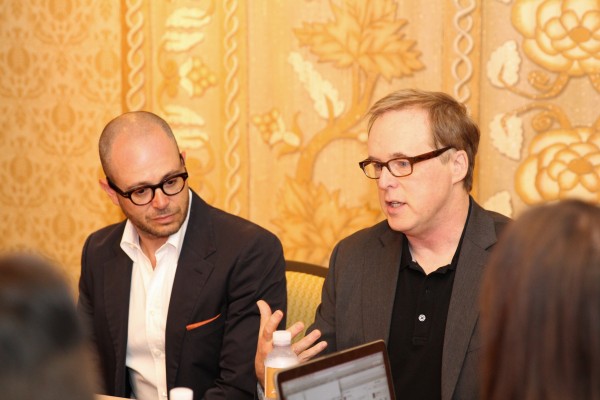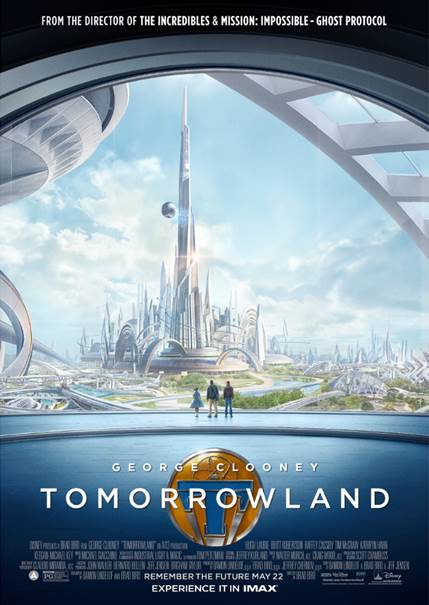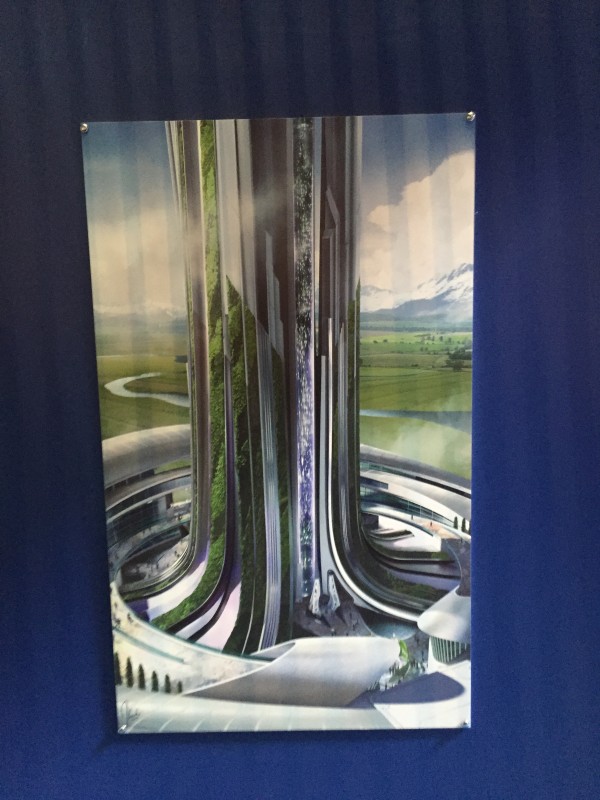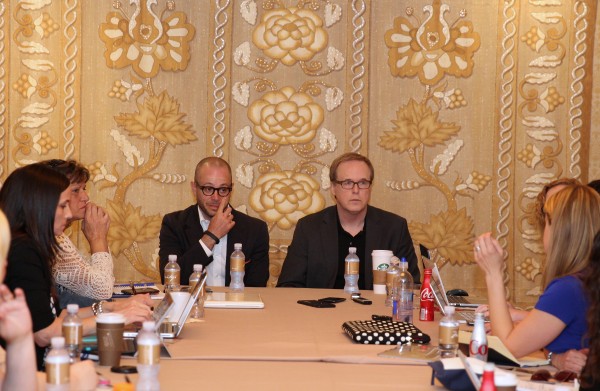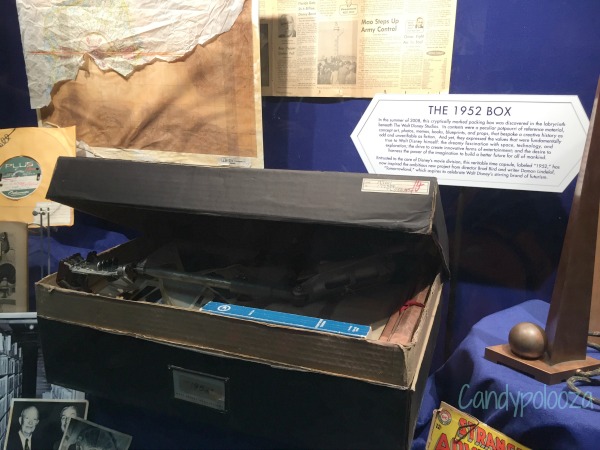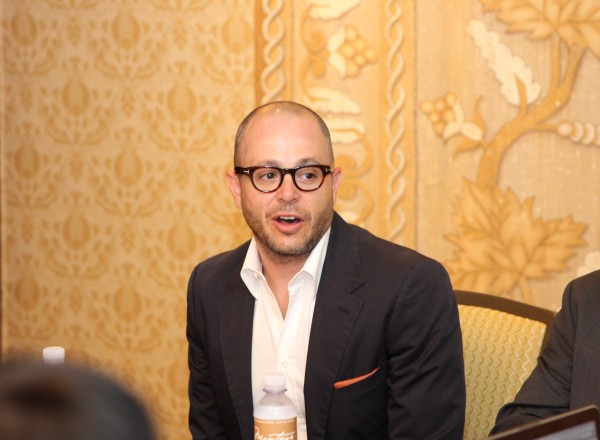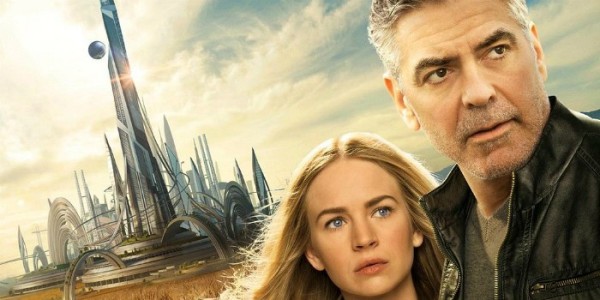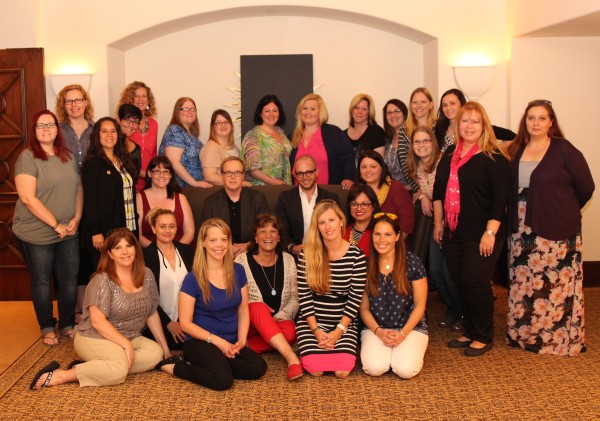Disclosure: I was provided an all-expense paid trip to the #TomorrowlandEvent in order to facilitate this post; however all opinions expressed are my very own.
I’ve often wondered what it is about a story that is intriguing enough for someone to turn into a screenplay for a movie. I was very excited to learn that we would be interviewing the writers and producers of Tomorrowland. We’d get a chance to pick the creative minds of Director/Producer/Writer Brad Bird and Producer/Writer Damon Lindelof. Because it is a dual interview with Bird and Lindleof, the name tags were left.
They were our first interview of the junket. It was so very exciting! They too were very excited and very playful with us.
“We get to warm up for George, we’re very excited. It’s all downhill from here.”
DAMON : “He’s pretty awesome.”
And with that enthusiastic entrance we got straight to the movie and questions.
Q: How did the information from the Disney archives help you to bring Tomorrowland to life on the big screen?
BRAD : Damon?
DAMON : I think that we are both fascinated with Imagineering and particularly Walt’s futurism. A lot of that stuff was rampant in the early days of designing the Parks itself. And in Tomorrowland obviously he came up with the concept in the 50s and 60s but I think that this sort of treasure trove of roads not taken, the part that Brad and I particularly zeroed in on was the 1964 world’s fair where there were a number of attractions that.
BRAD : For, yeah.
DAMON : Mr. Lincoln, carousel progress.
BRAD : Magic skyway.
DAMON : And we just felt like –-
BRAD : Small world.
DAMON : Yeah, small world of course. It would be really great to see those on the big screen kind of re-create that feeling. Our initial ambition was a lot higher but again the world’s fair as what they represented at the time, particularly in the 60s, the connection to Disneyland that was really the stuff that we kind of locked in on.
BRAD : But it’s also that world’s fairs in and of themselves were a thing where people would bring together their brightest minds and talk about the future. And they were semi regular event where people came together from all over the world and kind of traded ideas. And they had a utopian aspect. And when we were talking about what happened to the idea of a positive future we kind of started to notice that that great future sort of disappeared around the time the world’s fairs disappeared.
The, you know, the world was, went through world wars and had plenty of strife but people clung to the idea of things in the future will be better. And that idea seems to have been retired. And we are now everybody seems to be going, yeah it’s going to suck. You know? And is there anything we can do about it? No. So we’re all just kind of –, thank you. We’re all just kind of on this bus that we have no control over the destination.
And we were just kind of looking at each other going, why did that change? And when did it change? And you know, how do we get back to it? So that was kind of trying to do sort of a fable around that idea was kind of on our minds.
Q : You both are very creative individuals. It seems like you just love storytelling. So what do you do to feed that creativity and just help you tell those stories?
BRAD : Coffee. Yeah. It doesn’t have to be Starbucks by the way.
DAMON : I think, you know we watch, we watch a lot of TV. We go and see a lot of movies. And we tell our wives and children that that’s work. But it is the idea of constantly sort of surrounding yourself. I do feel for me in particular and I think that Brad shares this is we sort of grew up in that culture and the idea of saying like, I want to do this one day. But where we start almost every time that we get together is oh, did you see this? Did you read this? What do you think about that? And I think that we are so steeped we are fans of this material ourselves. The fact that we get to make it. And I think the minute that you start to seal yourself off and say, I’m just going to become completely introverted and write my own stuff and you close the gates to everything that surrounds you. I think in a lot of ways this movie as Brad was just saying is a little bit of a response to these other you know, to the sort of apocalyptic storytelling that we’ve been kind of barraged with. And we love the hunger games. And I want to see mad Max.
BRAD : Yeah, yeah.
On how the future is portrayed in movies now..
DAMON : But I also think like there’s got to be a future that isn’t of people trying to kill each other in the desert or teenagers killing each other.
BRAD : Or zombies killing each other.
DAMON : Or zombies killing each other. Zombies killing teenagers and all that stuff.
Q : In terms of the future itself there’s a lot of technology in the movie. And great that we can touch something and get transported somewhere else or surround us. What part of technology would you like to have today from the ones that we see in the movie?
DAMON : Well, I would love to be able to travel somewhere without having to actually get on a plane. I mean I love the idea of walking through a doorway and being somewhere else. I think that that would probably change the planet in wonderful and nightmarish ways. But I think that there are a lot of sort of dream concepts in this movie. And that was one of the things that attracted me was getting a chance to glimpse those things. Of course, you sit there and talk about all the things that you could put on screen and that’s a wonderful pie in the sky moment of any movie. And that’s usually very early. And then pretty soon you have to get down to the sobering reality after binging all my on what it could be, ha, ha. You know? And then you go, then you go, well wait a minute now that was great last night. I’m kind of hung over now but it’s two hours, we only get to spend this much money and we have a story to tell which means we can’t spend two hours just going, woohoo.
BRAD : Sure we can. Why not?
DAMON : But so you have to start saying what ideas are central to the story that you’re trying to tell. And sometimes your favorite notions don’t fit into the story you’re trying to tell. So you save that for another day.
Q : So when you’re writing do you bounce off of one another? Do you write in collaboration?
BRAD: Yeah, Damon has been developing this idea with Jeff Jensen for about six months. I was an admirer of Damon’s work on Lost. Any time the episode credited Damon I would like, go like that to my wife and go, this is going to be good. You know?
DAMON: And she say stop hitting me.
BRAD: Yeah. And, but I was a fan of Damon’s work. And on mission impossible at the very end when the movie was basically shot but there were a couple of things that were right. And so there wasn’t very much wiggle room. And Damon came on for about a month and help us fix some really very specific –. It was like brain surgery kind of writing where it had to fit into here and they are. And he did a wonderful job.
Clearly they are fans of each others work. It was really neat to see how they both admire each other.
BRAD: And we were just hanging out one day. And I said, what are you doing next? And he mentioned this idea that he’d been developing with Jeff. And it just sounded amazing to me. So that’s when I kind of jumped on board.
DAMON: Yeah, and I think just in terms of the process, the writing process was Brad was really wonderful because you know, he would come down to LA. We’d hold up in a hotel room for a couple of nights. Yeah, or I’d come back and forth and we’d just flip our laptops open and just sort of sit and talk. And that –, every time that I write in collaboration I write in a different way but I don’t like writing alone. And I really enjoy that process. And Brad makes it great. He has a –, he makes the perfect English muffins I have to say. Like he’s like –, and you have like bees and like his own hive. And he has. And I have to say like, I started writing very slow just so I could get more English muffins. That’s really what it was all about. Sorry, go ahead.
Q : Can you tell us more about the discovery of the 1952 box and how that inspired you in the movie?
DAMON : Yes, you know, I will say that the origin –. The more that we look into you know, what the origins of the box are and where it came from and who found it, the less –, you know, the less defined answers that we get. Suffice to say we became fairly convinced looking through it that we didn’t know exactly what it was. The items in it could have been you know, probably 80% of them were completely and totally uninteresting. But the ones that were interesting to us felt like, what if we were kids in third grade and someone put this box in front of us and said, tell us a story about the things that you find in this box. How would they all connect? And we took some things like the design for the, it’s a small world ride and Flushing Meadows in 64. And this weird kind of like disk that might have been an animation that Orson Welles might have had some interest in. And we sort of said, what if Walt Disney was a member of this secret group of geniuses plus ultra. And Tomorrowland itself was actually a cover for a real place that they built in an alternate dimension? And then we were kind of off to the races. And the box became just sort of you know, a part of the-
BRAD : Prompt.
DAMON : –the santa myth. It became sort of the North Pole but we were more focused on trying to leave presents under people’s trees. Bad metaphor but, Santa is real.
Q : What do you think people will learn or take away from watching this film?
BRAD : Well, I think we are hesitant to make it like broccoli and say you know, although I like broccoli –. But you know, this –, go see this movie because it’s good for you. That’s the sure way to have sagebrush blowing through the theater. I think first and foremost were out to –-
DAMON : Do you like broccoli kids? You’re going to love Tomorrowland. Yeah. Broccoli and homework? Yeah. We’re doing some viral with the broccoli industry. On the back of the box just a tie in.
DAMON : Yeah, absolutely. Hey kids. I’m good for you just like Tomorrowland. No one is writing this down. This is gold.
BRAD : But I mean our goal first and foremost is to make a great time at the movies. And you know, go well with popcorn and all of that. That said, my favorite rides in terms of movies are rise where I still think about them later. And then you are –, before the like even come up in the theater you’re thinking about something else and you know that you paid money, you know that you were not bored. And you know that you heard a lot of loud sounds and saw some flashy movement. But there’s not a lot to take away. And I don’t think those two things need to be mutually exclusive, you know. I loved ET you know, years ago. On the face of it, it’s a movie about a rubber alien puppet you know, but it absolutely swept you away and got you emotionally involved. And you thought about it. You know? And we, I think we would like to be that. And we would like people hopefully to think –, come away thinking I have a hand in the future. I’m not a passenger on this bus. I can be the driver. And that we collectively are in charge of where we want, what we want the future to be. That it’s a malleable thing that’s changing every day. And it’s being created by what people do today.”
DAMON : We have a young woman in the movie that you guys are well aware of and she is being barraged with the polar ice caps are melting, things are going to be much worse in the future. And she asks the only relevant question which is, can you know, can we fix it? And we hope that you walk out of the movie at the end saying, you can but you have to do something. You can’t just sort of sit around and the future isn’t something that happens to us it’s something that we make happen. And I think that she certainly comes out of the movie feeling that way.
Q : We have one last question. Being a huge Welles fan and now seeing the amazing Tomorrowland, your imagination is incredible. I was just wondering do you know where you’re going with the storyline from start to end or does it change? Because I’m noticing Lost in Tomorrowland it just blows me away. It’s so creative and I don’t know if you know where you’re going with the story from the start.
DAMON : It was originally called Lost in Tomorrowland. I think that when I get engaged in a story there is a fair amount of sort of mystery involved in it. I just, I love the idea of the unknown and sort of like what is that? Especially when we go to movies these days and you see the trailers before the movies. And it sort of feels like, oh in two minutes they just told me the entire movie. There’s like, I want to go see the avengers but I kind of feel like I just saw the avengers. And so we were engaged by this idea of Tomorrowland because you hear that title and you go, it feels familiar, it creates an emotional idea in me but I don’t exactly know what it’s about. And the same is true of Lost. At the same time you can’t write unless you know where you’re headed.
Because every time you come to a crossroads, every time you’re at a fork, if you don’t know where you’re headed you’re just going to sit there and basically not know which way to turn the wheel. That said, as you’re driving. Often especially if –, some –, if you switch the driver and the passenger from time to time you make all these very interesting discoveries which is why I love collaborating. And I think that when Brad, Jeff Jensen and I all sort of got together and started talking about the story of Tomorrowland, we all kind of felt like we knew what the story that we wanted to tell was. And how it was going to end. Where it goes from here, there are a number of different possibilities. But we didn’t want it to feel like this movie is a cliffhanger or were setting up a franchise or there’s nine different characters coming in at the end. Now we’re setting up our own Tomorrowland universe. We sort of felt like if this is the only movie that we get to make we wanted to feel like it’s complete which is a much different storytelling mechanism that TV where every episode is designed to get you to watch the next episode. So, there was somewhat of a relief to say you know, this is their journey. This place has a problem. These characters fix that problem and things are much better off than they were when we started the movie.
Make sure to read the interview posts that have been published so far. You won’t want to miss what George Clooney shared, our visit to the Disneyland sneak peek and our awesome interview with the amazing Britt Robertson.
